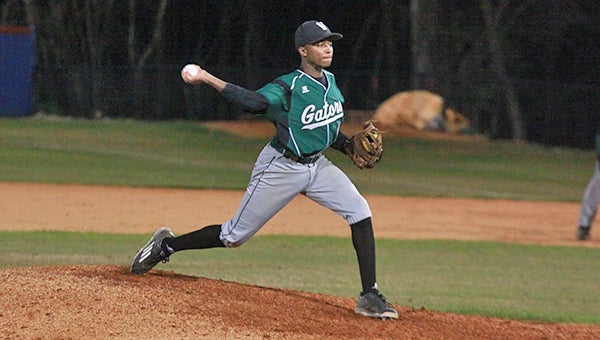Baseball coaches OK with new pitch limits
Published 8:00 am Friday, October 28, 2016

- Vicksburg High pitcher Marshall Banks throws in a game last season. The MHSAA passed a rule earlier this month limiting the number of pitches each pitcher can throw per game. (File/The Vicksburg Post)
The days of ironman pitching performances are over in Mississippi.
At its October meeting earlier this month, the Mississippi High School Activities Association’s executive committee approved a proposal that places a limit on the number of pitches a pitcher can throw in a game, requires coaches to publicly report pitch counts, and to provide mandatory rest for their hurlers.
The new rule goes into effect for the 2017 high school baseball season. It was introduced over the summer after the National Federation of High Schools required all of its member associations to implement pitch limits.
“I’m fine with it. In eight years that I’ve been here, I don’t think we would have broke any of their rules but maybe once and that would be the days of rest,” Warren Central coach Conner Douglas said. “I don’t think we’ve ever had a kid go above 125 (pitches) that I can remember. I don’t think it affects us. We’ve always taken care of our guys.”
The MHSAA rule:
• Sets a maximum pitch limit of 120 per game for each pitcher, although a pitcher can surpass that number if he reaches the limit in the middle of an at-bat.
• Requires mandatory rest days following an outing. A sliding scale will be used based on the number of pitches thrown in a game. A pitcher who throws 25 or fewer pitches can throw again the next day. The player must have at least one day of rest following an outing of 26-50 pitches; two days rest after throwing 51-75 pitches; three days rest after throwing 76-105 pitches; and four days rest after throwing more than 106 pitches.
The rest days apply only to time on the mound. Players can still bat and play other positions in the field between mound outings.
• Requires coaches to record each player’s pitch count on MaxPreps.com — a statkeeping web site used by MHSAA schools in a number of sports — within 24 hours of a game.
• Sets harsh penalties for violating the rule. Schools that use a player who has surpassed the maximum pitch limit or hasn’t had enough rest days are subject to forfeiture of the game and a $250 fine.
Like Douglas, Vicksburg coach Derrick DeWald didn’t foresee the new rules being a major issue for his program. He said his pitchers rarely get very far above the 100-pitch mark that’s the general rule of thumb for when to pull a pitcher.
DeWald, however, did express some concern about record keeping. Most teams these days have iPads and scorekeeping apps that keep up with pitch counts, but a miscount or bad entry could easily lead to an unintentional violation.
“You’re going to have to have someone that knows how to use Gamechanger. If you’re not careful, you can screw up,” DeWald said, referring to a commonly used scorekeeping app that allows users to immediately upload stats to MaxPreps.com. “We’re basically piloting this program, so I’m anxious to see how it works. If you’re not careful, you’re going to get burned.”
Douglas also expressed concern about who will be responsible for keeping an official pitch count. Even in his own dugout, he said, multiple people keeping up with it often have different numbers.
In a release, the MHSAA said it will monitor the rule during the 2017 season and adjust it as necessary.
“The only thing different I think they could do is find a better way to monitor it. Who’s going to report it? Once you get into rivalry games, that could get into being a disaster, frankly, as far as who’s going to agree on how many pitches,” Douglas said. “Even in our dugout we’ll have three pitch counts and all three of them are different. It’s easy to lose track of one or two pitches, and even one or two an inning can add up to eight or 12 a game.”
Another area of concern is how to monitor pitchers when they’re away from their high school teams. Many top players participate in showcases or play on tournament teams even during the high school season. Those pitches don’t count toward the MHSAA limit, but are just as draining to an arm.
DeWald said that’s a huge issue that requires cooperation between coaches and parents to deal with.
“It goes back to coaches knowing their pitchers, parents knowing their sons, and parents making sure they’re not overabused,” DeWald said. “If you’re not taking care of your kid, shame on you.”
Besides those thorny issues, both Warren County coaches agreed that the limits will change the way teams approach their schedules.
Doubleheaders and multiple-day tournaments are common early in the season. The meat of the schedule typically features two division games and a third non-division game in a five-day span. Best-of-three playoff series are usually played on consecutive days, or within a span of four days.
Without the ability to bring back an ace pitcher on short rest, Douglas and DeWald both said teams will have to work harder to develop deep pitching staffs. It could also lead to some intersting in-game strategy, such as pulling a pitcher before he throws 76 pitches and requires an extra day of rest.
“The playoffs is what’s going to be the biggest kicker,” Douglas said. “Division games and all, you can stretch it out. Once the playoffs start, you may have to play your three-game series three days in a row because of rain. If that kind of situation occurs, you better have more than two arms.”






